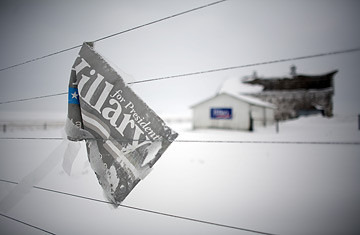
Signs supporting Hillary Clinton near Vinton, Iowa, December 30, 2007.
As the final frenzied days of campaigning for the Iowa caucuses fly by, Iowans are bracing not only for the judgment day but for the bittersweet day after — when the many presidential candidates, their thousands of campaign workers and countless journalists stampede out of the state, often even before the sun rises on January 4.
After one of the longest, most intense run-up seasons in the caucuses' recent history, Iowans will suddenly be back on their own again after January 3. Gone will be the packed political rallies, the campaign workers' fawning attention, the opportunity to make or break Mike Huckabee, the possibility of bumping into Bill Clinton and Magic Johnson at the grocery store.
Iowans will be able to answer their telephones again, free from automated robo-calls and solicitous pollsters. They can watch television and listen to the radio, free from a barrage of political ads. They can switch from dissecting the candidates to grousing about the weather.
But there's no doubt that the sudden peace and quiet will be a double-edged sword; as the extraordinary excitement and activity abruptly stops, the double whammy of life after the holidays and the caucuses will leave some Iowans down in the dumps. "This is a huge event. It really picks up people's moods — they see themselves being viewed nationally as very important to a very important process," says Larry Hejtmanek, director of a Des Moines mental health center and an avid caucus-goer. "The downside is January 4. It's all over. You have a normal letdown. People say 'I'll be glad when the phone stops ringing,' but I don't think they really feel that way."
Not that Iowans expect the nation's sympathy. We know we've had more than our 15 minutes. We know the national attention has been a bonanza for the state's hospitality industry, media outlets, politicians and pundits. (Des Moines fairly glowed after it was described recently as "cool" by the New York Times.) We realize that for one brief shining moment, we're no longer confused with Ohio or Idaho. "Iowa matters in a very serious way, despite all the punditry a year ago that it wouldn't," says David Redlawsk, a political science professor at the University of Iowa.
Which, of course, once again makes Iowa's unique role every four years vulnerable. Iowans are very familiar with the arguments against giving such a small demographically unrepresentative state such a big say in the presidential race. We know the caucus critics are grumbling again. ("Who the hell cares about Iowa?" New York Post columnist Cindy Adams growled recently.)
True, only a small percentage of Iowa voters participate in the caucuses. (In 2004, about 122,000 Democrats, out of 573,631, actually took part; President Bush was unchallenged. Some predict a record turnout this year, weather permitting.) But despite reports to the contrary, most people who show up at the caucuses won't be party activists or people with a vested interest but instead everyday folks doing their civic duty. "Most are just friends and neighbors, they're not political animals," says Redlawsk.
Most didn't ask to play such a major role. They just happen to live in a state that just happened to become "first" and "important" — an unlikely position that is truly just a historical accident, the unintended consequence of several developments: Democratic party rule changes in the late 1960s that pushed Iowa earlier, shrewd Democratic presidential campaigns in the 1970s that used the caucuses to gain attention, and a few eagle-eyed national journalists.
"No one made a conscious decision to say 'Iowa should be first,'" says Redlawsk. "I'm not sure anyone would have invented this process." Yet Iowans have risen to the occasion, becoming "the most politically knowledgeable and aware voters in the country," argues Redlawsk, a New Jersey native and an active Iowa Democrat. "The system actually works quite well, despite its oddities and limitations. It's an accident that's panned out very well."
And really, don't Iowans deserve some credit for the many town hall meetings attended, the many questions asked, the many speeches endured? Surely the white-haired man who sat beside me in the bleachers at a candidate's event, diligently taking notes, deserves a gentle pat on the back. So do the Iowa high school kids who marched in neighborhood parades behind candidates' floats. And the volunteers who have canvassed for candidates door to door, rain (snow, sleet, freezing fog) or shine.
"The typical image of Iowa is we're this kind of beige state, this boring place," says Hejtmanek. "Usually Iowans are apologizing for where they live. That's not the case with caucus season."
Up there with the Iowa State Fair and the state high school basketball tournament, the caucuses have become a defining event for Iowans — and a task they've embraced. "We have a job to do and people are watching," says Tom Morain, a state historian. "But once the circus moves on, I don't think we expect anyone to continue to pay attention to us. We'll want to think that we acted responsibly, that we took the measure of the candidates and did a respectable job."
